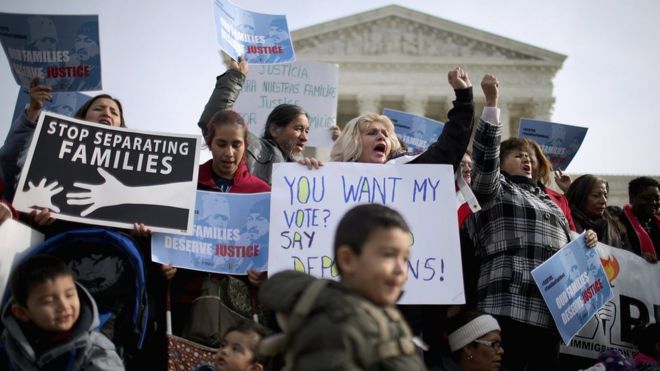By Samuel Miller
Impunity Watch Reporter, North America and Oceania
WASHINGTON, D.C., United States of America — The Supreme Court on Tuesday said it will decide whether President Obama has the authority to declare that millions of illegal immigrants be allowed to remain and work in the United States without fear of deportation. The justices also added a question on whether Obama’s action violated the Constitutional provision that he sees the laws be faithfully executed.

The court will most likely hear the case sometime in April, with a ruling before the court adjourns in June.
If the court rules by this spring in favor of the White House, President Obama could begin putting the changes into effect during his final months in office. But if the administration loses, court battles could keep the program on hold for several more years.
With Congress deadlocked over an immigration overhaul, in November 2014, President Obama cited his executive authority in making changes in immigration policy to give a temporary reprieve to illegal immigrants whose children hold U.S. citizenship or permanent residency. The plan sought to prioritize removal of serious criminals while allowing parents of children to work without fear of deportation.
The president’s program, called Deferred Action for Parents of Americans and Lawful Permanent Residents (DAPA), would allow illegal immigrants in those categories to remain in the country and apply for work permits if they have been here for at least five years and have not committed felonies or repeated misdemeanors.
Texas and 25 other states filed suit to invalidate the President’s proposed program. Fifteen states and the District of Columbia, along with leaders of major cities including Houston, Los Angeles and New York, have backed the administration.
Previously, in 2015, a federal district judge in Texas halted the immigration plan, a decision upheld by the Fifth U.S. Circuit Court of Appeals. In each case, the lower courts found the administration had not followed proper administrative procedures in issuing the regulations.
In a statement, Texas Attorney General Ken Paxton welcomed the Supreme Court’s review.
“In deciding to hear this case, the Supreme Court recognizes the importance of the separation of powers. As federal courts have already ruled three times, there are limits to the President’s authority, and those limits enacted by Congress were exceeded when the President unilaterally sought to grant ‘lawful presence’ to more than 4 million unauthorized aliens who are in this country unlawfully.”
Additionally, the court added an additional question to the case. The court asked the parties to address whether the immigration plan violates the Take Care Clause of the Constitution. That is the provision directing the president to take care that the laws be faithfully executed.
Experts said the addition of the Constitutional issue could simply signal a desire to make sure the parties address all legal issues that could be relevant to the case. But the added question could be seen as signaling that some justices don’t agree with the Justice Department’s claim that the states’ interests haven’t been impacted sufficiently to give them legal standing to sue over the immigration initiatives.
“In deciding to hear this case, the Supreme Court recognizes the importance of the separation of powers,” said Paxton.
For more information, please see:
BBC News — Barack Obama’s migrant plan taken up by US Supreme Court – 19 January 2016
CNN — Supreme Court to take up Obama immigration actions – 19 January 2016
NBC News — Supreme Court to Consider Obama Immigration Rules – 19 January 2016
Politico — Supreme Court to rule on Obama immigration orders – 19 January 2016
USA Today — Supreme Court will rule on President Obama’s immigration plan – 19 January 2016
Wall Street Journal — Supreme Court to Rule on Obama’s Bid to Block Deportations – 19 January 2016
Washington Post — Supreme Court to review Obama’s power on deportation policy – 19 January 2016